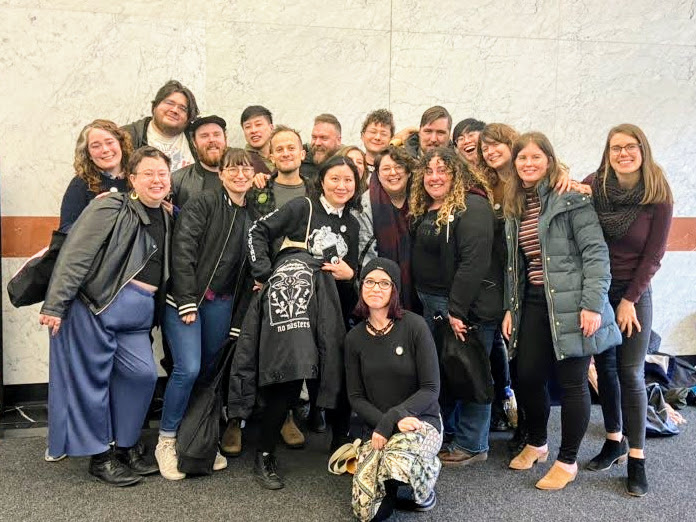Issue 11: Listen: You Are Not Alone
02 Oct 2020
In this issue, Clarissa Redwine, tech worker and organizer, shares her recollections of the successful unionization effort at Kickstarter, and invites us to learn more in her podcast. In the news, workers continue speaking out against ICE contracts and political manipulation, while new tech and media countermeasures emerge. Also, a history of the Pullman Strike, and a song about train monopolies from 1882.

Kickstarter United, moments after winning their union. / Source
The Worker’s Perspective
By Clarissa Redwine
One evening, about two years ago, my coworker Taylor called me out of the blue. At the time, I was living in SF and he was in Brooklyn. We made some small talk, but I wasn’t sure why he was calling me so late, so eventually I asked, “Hey, whatcha callin’ me for, anyway?”
I was about to get my first taste of the organizing effort that built Kickstarter’s union. Taylor brought up our shared experiences at Kickstarter, walking me through the many challenges that, like weeds, always seem to crop up in the workplace. Then he made a case for structural change at Kickstarter — change that could last because it wasn’t dependent on the people at the top.
At this point, I had been at Kickstarter for two years and, even though I hadn’t experienced any classic labor issues directly, I knew that many of my coworkers had. I had heard story after story of manager retaliation, pay inequity, and mishandled sexual harassment processes. If a union could give workers the power to address these issues, then I was in.
Since I was so new to the labor movement, I felt I was really there to add weight. I was there to lend power to folks who had experienced these issues directly. So even though I was a more visible organizer and part of the organizing committee, all the way through I was mostly a sponge with ears, soaking up the experience and wisdom of my fellow organizers.
Together, we learned how to build support across the company. We inoculated our coworkers and fortified our solidarity. We endured captive audience meetings, retaliation, and illegal firings. Almost exactly a year after Taylor called me up, he and I were fired for organizing. This was the week that management fired a third of Kickstarter United’s organizing committee. But the union was resilient and just months after we were pushed out, we won the union vote. And when management laid off 40% of the company at the start of the pandemic, the union helped workers negotiate for a strong severance package with both dignity and security.
Looking back on it, I would say that the bread and butter of organizing is having meaningful conversations with fellow workers. The more we know about each other’s working conditions, the better we can fight for each other and for systemic change. So, with the help of dozens of my fellow Kickstarter organizers, I’ve put together a collection of these conversations in the form of an oral history.
The Kickstarter Union Oral History is voiced by the people who, over the course of the union drive, taught me everything I know about organizing. It’s an emotional dive into the specific events, conversations, and actions that forged the Kickstarter union. But most of all, it’s a love letter to folks everywhere who are building solidarity in the workplace. You are not alone.

Kickstarter Union Oral History / Source
Listen to the first two chapters of the Kickstarter Union Oral History here!
In The News
Sam Anderson, a tech worker at Hootsuite, raised the alarm on Hootsuite’s three-year deal with ICE, after internal protests yielded no results. From Sam’s thread:
“Been debating talking about this publicly because I don’t want to get fired, but it seems like the cat’s already out of the bag so whatever: yesterday Hootsuite signed a three-year deal with ICE. Over 100 employees have been extremely vocal in their opposition to this deal.”
Less than 24 hours later, Hootsuite issued a statement that they would “not proceed with the deal with ICE”. In a confusing twist, Vice reports that Hootsuite lied about stopping the deal, and is instead selling licenses to ICE via a broker.
The publishers of the appropriately-named game Cyberpunk 2077 announced mandatory 6-day work weeks in the crunch time before the release date, reneging on an earlier promise to avoid forced overtime. It doesn’t have to be this way. Game programmer Magne Skjæran responded on Twitter, saying:
This is outrageous, and is a perfect example of why unionizing is so important.
We managed to ship CK3 with zero crunch and it’s the best game we’ve ever made. Crunch is unproductive. Crunch is exploitative.
Crunch should have no place in our industry.
Unionize today.
The trend of tech for police continues. Federal authorities procured law enforcement in areas where protests are ongoing with “taser shields” sold by companies that publicly cite conspiracy theories. Luckily, there may be simple technical countermeasures to disable these weapons.
Police are also working for tech. Amazon called the cops on several congresspeople visiting a warehouse, and they showed up right quick.
The Reveal showed how Amazon has been covering up one its biggest safety crises. The company claimed their warehouse automation and faster distribution is making work safer for humans, but this graph shows just the opposite: workers at fulfillment centres with robotics are more likely to suffer serious injuries.
From the “tech working for landlords” department:
- Amazon announced a new version of Alexa targeted at landlords, though they promise that landlords would not have access to tenants’ data.
- A new gig startup launched: on-demand eviction muscle. It’s hard to tell if it’s a legitimate business or merely a publicity stunt for the parent company, and we’re not sure if that would make it better or worse.
- No, we’re not going to link to Ring’s new home security camera-drone.
In case you’re wondering: yes, the problems are systemic, perhaps even structural. Peter Thiel, the powerful venture capitalist who has wielded much influence over what tech gets funded, has been happily hosting dinners for the racist right. The U.S. Equal Employment Opportunity Commission confirmed a pattern of illegal age discrimination at IBM. And at Pinterest, reports emerge of discrimination against Black employees.
Facebook. Can it be redeemed? Should it be abolished? Consider:
- Last month, employees asked Mark Zuckerberg why Peter Thiel, who sits on Facebook’s board, met with white nationalists. Zuckerberg declined to comment.
- Zuckerberg did, however, say that for their own protection, workers were prohibited from using Facebook’s internal communication platform to acknowledge Breonna Taylor’s murder and injustice at the hands of police.
- Meanwhile, Facebook is being sued over inadequate handling of user reports about the Kenosha Guard’s violent posts that led to the killing of two Black Lives Matters protesters. In addition to accusing Facebook of conspiring with the Kenosha Guard and the Boogaloo Bois, the suit argues that Facebook’s actions deprived plaintiffs of their ability to peacefully protest.
- Facebook is deeply implicated in political manipulation. Facebook’s clumsy handling of “voting disinformation” threatens official’s ability to disseminate critical last-minute voting information. Facebook is also being called out for enabling hate speech in Myanmar, not just a failure of moderation, but also the result of allowing the military to maintain “propaganda accounts.”
- Sophie Zhang, a former Facebook data scientist passed on over $60k in severance in part to be able to share details on how her former employer ignored coordinated manipulation. Facebook’s response was lackluster as well as dangerous. We applaud Zhang’s courage and commitment, and thank all Facebook workers agitating, educating, and organizing to prevent further harm by the company.
Finally, here are some of our favorite recent examples of tools and media to protect from the harms of tech:
- Who’s watching you on the web? The Markup made Blacklight to expose tracking and other safety concerns on websites you visit.
- Want to limit your smartphone screen time? Change your app icons to photos of the founders and CEOs – like this, or this.
- How can tech workers do better? A new documentary film features Rachel, a former FightMe employee, seeking atonement for her many past mistakes. We can all learn something from this important film.
In History
The Anti-Monopoly Party was a short-lived US political party founded in 1884 and dissolved in 1886, at the height of the railroad boom. During its time, the Anti-Monopoly Party pushed for many policies we might consider progressive today, including women’s suffrage, progressive income taxation, antitrust legislation, and generally tilting the balance of power away from capital and towards labor. Perhaps most importantly, the party opposed the granting of public lands to corporations.
Imagine any political party today opposing tech companies the way the Anti-Monopoly Party opposed the railroad companies. These days, with cars everywhere, it may be difficult to imagine how, for roughly half a century, railroad transportation faced virtually no competition. This gave rise to the “railroad barons” who – despite attempts to cleanse their name with philanthropy – remain our best reference for modern-day tech CEOs and investors robbing the public good for their private gain.
Railroad barons were not unopposed, however. One of the most important moments in tech labor history was the Pullman Strike, which began shortly after May 11, 1894. The strike began when Pullman workers walked off the job to protest company owner George Pullman’s decision to conduct mass layoffs while raising the cost of living – in a company town called Pullman, Illinois, and in the middle of a severe economic recession.
Within a few days, sympathy strikes began along the lines from Chicago to California. An estimated 125,000–250,000 workers at 29 companies joined in disrupting the entire railroad industry – and the industries depending on it. As the strike rolled on, workers took action like burning freight and coal cars in Chicago, while company owners and politicians sent strikebreakers and federal troops to put down the unrest.
The strike brought out mixed emotions from the general public. Nearly 70 days in, the strike was ended by injunction, an early instance of legislative interference in organized labor.
The railroad industry’s regulatory legacy means that in California today, the same body overseeing rail affairs also oversees transportation network companies (TNCs) like Uber, and Lyft. In July, that body ruled that ride-hail drivers are, indeed, employees, not independent contractors. Not surprisingly, Uber, Lyft, DoorDash, and others pooled nearly $200m to run Prop. 22, a ballot initiative that would create a legal carve-out for these companies. We believe Prop 22 should be analyzed, exposed, and defeated, and we look at The Anti-Monopoly Party and organized opposition to Big Railroad for inspiration.
In Song
Anti-Monopoly War Song, by the Anti-Monopoly Party
In 1882, 12 years before the Pullman strike, The Anti-Monopoly Party of California composed a song taking aim at railroad barons and their “monstrous” trains emitting “clouds of poisoned smoke” while charging “unjust unlawful fare” and rolling over common workers on “on his Master’s Rail.” Listen along with the full song lyrics here.
Onward! onward to the fray!
Hurl the monster from your way,
Let your cry of battle be
Ruin to Monopoly!
Citizens of all degrees,
Victims of vile subsidies,
Ye, who basest burdens bear
Of unjust unlawful fare,
Cast the loads from off your backs,
Tear the tyrants from his tracks,
Let elections glorious morn,
show your moving might of scorn.
Cast your votes for honest men;
Trust no wily tongue or pen
Should the rail-road hireling dare
Offer smile and promise fair,
Tell him you have had enough
Of the Engine’s poison puff
And send him to oblivion’s vale
Riding on his Master’s Rail.